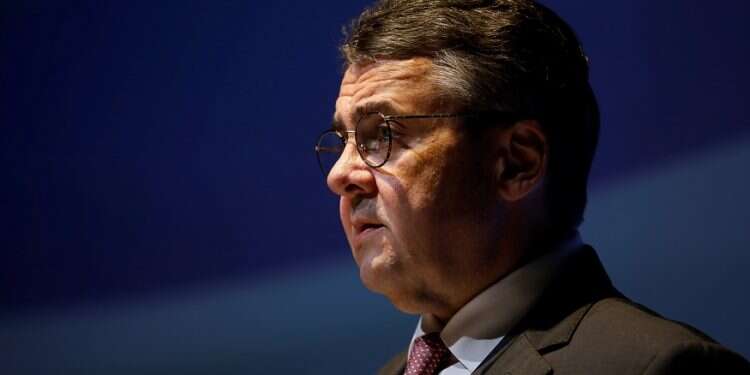German Foreign Minister Sigmar Gabriel warned Israel it faced growing frustration in Europe amid concern for the future of a two-state solution to the Israeli-Palestinian conflict.
Speaking at a security conference in Tel Aviv, Gabriel said the Israeli government's ambivalence toward a Palestinian state showed a lack of direction and suggested that U.S. President Donald Trump's unflinching support of Israel wasn't necessarily in Israel's best interest.
Germany is one of Israel's closest and most important allies, and Gabriel stressed he was worried about its path given the prolonged stalemate in peace talks.
"As a friend of Israel, and as a foreign minister of a country with a special commitment to your country's security, I am sincerely concerned about Israel's mid- to long-term options," he said.
Gabriel warned Israel against being lulled into indecision because of the warm embrace of the Trump administration, which recently recognized Jerusalem as Israel's capital and has been critical of the Palestinian leadership.
"The Americans are taking your side more clearly than ever before, but is this really only a good thing? When I think of the likely consequences I think this is more ambivalent," Gabriel said.
He said the U.S. had long acted as an "arbiter" in the region despite its close ties to Israel, citing the 1979 peace deal with Egypt as an example. But he asked: "Can the Americans still play such a role if they take sides so openly?"
In a thinly veiled threat about cutting off aid, he said some members of Israel's cabinet were "explicitly against the two-state solution" but that such a solution "has always been the foundation of our engagement for Israeli-Palestinian peace and for the large amount of funding" from Germany and Europe.
"It is increasingly difficult for people like me to explain to them the reasons why our support for Israel must persist," he said. Gabriel pointed to concerns about violence, hatred, and Israeli settlement-building in occupied territory that Palestinians seek for a future independent state.
"What exactly is Israel's strategy in this conflict? Some members of Israel's cabinet are explicitly against the two-state solution. … These, at best, mixed signals do not go unnoticed in Europe where there is clearly growing frustration with Israel's actions."
In an open challenge to critics of a Palestinian state, Gabriel asked, "How do you want Israel's future to look like? Are you prepared to pay the price of perpetual occupation?
"Germany is looking forward to the day when it will be able to move its embassy in Israel to Jerusalem. But let me add: in two states with Jerusalem as their capital. There is no shortcut here."
Earlier in the day, Prime Minister Benjamin Netanyahu corrected the record during a joint news conference held with his German visitor after Gabriel said he was encouraged that Netanyahu's government supported a two-state solution "with secure Israeli borders."
"That we will control security west of the Jordan (River). That is the first condition," Netanyahu objected, cutting Gabriel off and adding, "Whether it's defined as a state when we have the military control is another matter. I'd rather not discuss labels, but substance."
Gabriel suggested that the discussion might be revisited at another time, "far away from now."
Gabriel has been an outspoken supporter of greater efforts to combat anti-Semitism in Germany, including creation of a new government commissioner post to oversee such initiatives.
At the same time, he is under pressure at home to take a hard line on the continued building of Israeli settlements in violation of international law.
Earlier, Gabriel met with Netanyahu in Jerusalem. Standing alongside Netanyahu, Gabriel said, "Israel always can count on Germany as a fair partner to defend the security of Israel."
Netanyahu abruptly canceled a meeting with Gabriel last April over his meeting with Breaking the Silence, a group of Israeli army veterans critical of the country's military actions in the West Bank and the Gaza Strip. Israeli leaders oppose the group's work, citing the anonymity of its claims and its outreach efforts abroad to foreign audiences.
Gabriel also met Palestinian Authority President Mahmoud Abbas in Ramallah, where he said there was no alternative to a Palestinian state alongside Israel and expressed reservations over Trump's recent moves.
"The status of Jerusalem must be negotiated between the two parties, and shouldn't be imposed by any external power, and this is not only the position of Germany but also the position of the entire EU," he said.
"The peace process is going through tough times," he added.




